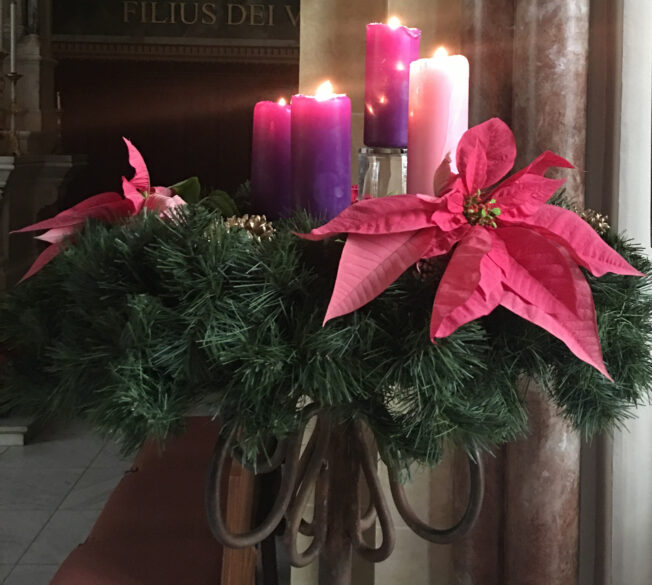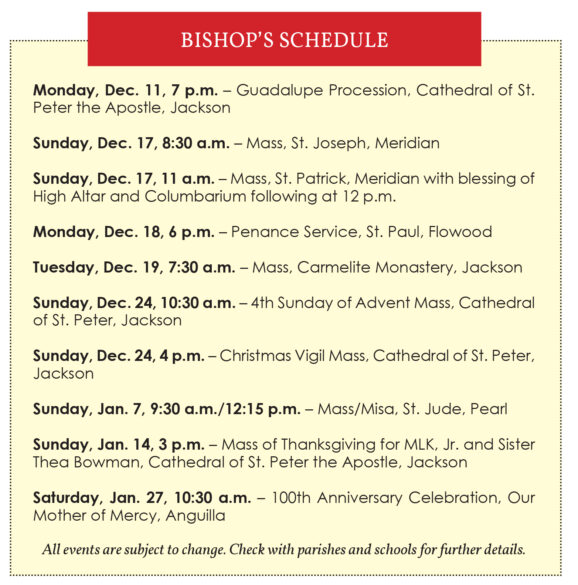
By Bishop Joseph R. Kopacz, D.D.
“Grace to you and peace from God our Father and the Lord, Jesus Christ be with you,” was proclaimed on the first Sunday of Advent in the second reading from the first letter of St. Paul to the Corinthians. (1:3) We can say that this is St. Paul’s signature salutation when he wrote to each of the Christian communities he helped to establish.
This is the greeting at the outset of the letters to the Romans, 1 and 2 Corinthians, Galatians, Ephesians, Philippians, Colossians, 1 and 2 Thessalonians, 1 and 2 Timothy, Titus and Philemon. Likewise, St. Peter greets his fellow Christians in his two letters with the near identical greeting and goes a step further in his enthusiasm with the phrase “in abundance.”
This signature salutation was not only a friendly greeting from the two apostles but is the inspiration of the Holy Spirit across the pages of the New Testament, as well as the mind and heart of Jesus Christ begun at the Last Supper and announced throughout the resurrection appearances. This salutation frames the Bible as the final inspired words of the book of Revelation. “The one who gives this testimony says, “Yes, I am coming soon.” Amen! Come, Lord Jesus! The grace of the Lord Jesus be with all.” (Revelation 22:20-21)

Maranatha – come, Lord Jesus – is the longing and the vision for the season of Advent. But this desire is central to our belief and hope throughout the year, especially in our celebration of the Eucharist.
After the consecration and transformation of the bread and wine into the Body and Blood of the Lord, the congregation pronounces, “when we eat this bread and drink this cup we proclaim your death, O Lord, until you come again.”
Before the reception of holy communion following the Lord’s prayer the priest makes the following entreaty of the living God. “Deliver us, Lord, we pray from every evil, and grant us peace in our days, that with the help of your mercy we may be always free from sin and safe from all distress as we await the blessed hope and the coming of our Lord, Jesus Christ.” When we proclaim the Nicene Creed after the homily, we express our eagerness for the Lord’s coming, “as I look forward to the resurrection of the dead and the life of the world to come.” Amen.
The concluding verses of the Bible infuse the Mass with eschatological hope and graciousness, reminding us that “for here we have no lasting city,” (Hebrews 13:14) and that our citizenship is in heaven and from there we are expecting our savior, the Lord Jesus Christ. (Philippians 3:20) At regular intervals it is a gift to be able to transcend our world and circumstances and raise our hearts and minds to God through faith, prayer and praise.
However, this is not an invitation to escape from trials, tribulations and temptations. Come, Lord Jesus is also rooted in the present moment.

With St. Paul, we rejoice to know that the Lord is near, standing at the door and knocking. (Revelations 3:20) Thus, our prayer for the Lord to come is intended for the moment at hand.
The signature salutation of St. Paul and St. Peter for grace and peace in abundance from God is the gift package from God to help us reach our eternal destiny. They are intended to deliver us from every evil, to free us from sin, and to keep us safe from all distress as we await the blessed hope. Are these not among the finest of gifts?
As we rightfully consider the gifts, we are purchasing for those we love, let us not leave this package of grace and peace unattended and unopened. These gifts are at our disposal in daily prayer, at Mass, and in all of our acts of loving care in daily living. Indeed, it is the package that keeps on giving forever. It is God’s abundance. Maranatha, come, Lord Jesus!
